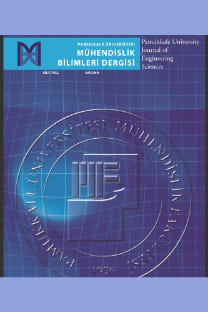K-Ortalamalara dayalı yeni yoğunlaştırma stratejisi ile Parçacık Sürüsü Optimizasyonu
K-Ortalamalar, PSO, Yoğunlaştırma stratejisi
Particle Swarm Optimization with a new intensification strategy based on K-Means
Intensification strategy, K-Means, PSO,
___
- [1] MiarNaeimi F, Azizyan G, Rashki M. "Horse herd optimization algorithm: A nature-inspired algorithm for high-dimensional optimization problems". Knowledge-Based Systems, 213, 1-17, 2021.
- [2] Chou JS, Truong DN. "A novel metaheuristic optimizer inspired by behavior of jellyfish in ocean". Applied Mathematics and Computation, 389, 1-47, 2021.
- [3] Ahmadianfar I, Bozorg-Haddad O, Chu X. "Gradient-based Optimizer: A new metaheuristic optimization algorithm". Information Sciences, 540, 131-159, 2020.
- [4] Askari Q, Younas I, Saeed M. "Political optimizer: A novel socio-inspired meta-heuristic for global optimization". Knowledge-Based Systems, 195, 1-25, 2020.
- [5] Shadravan S, Naji HR, Bardsiri VK. "The Sailfish Optimizer: A novel nature-inspired metaheuristic algorithm for solving constrained engineering optimization problems". Engineering Applications of Artificial Intelligence, 80, 20-34, 2019.
- [6] Arora S, Singh S. "Butterfly optimization algorithm: a novel approach for global optimization". Soft Computing, 23(3), 715-734, 2019.
- [7] Kiran MS. "TSA: Tree-seed algorithm for continuous optimization". Expert Systems with Applications, 42(19), 6686-6698, 2015.
- [8] James JQ, Li VO. "A social spider algorithm for global optimization". Applied Soft Computing, 30, 614-627, 2015.
- [9] Kennedy J, Eberhart R. "Particle swarm optimization". Proceedings of ICNN'95-International Conference on Neural Networks, Perth, WA, Australia, 27 November-01 December 1995.
- [10] Haklı H, Uğuz H. "A novel particle swarm optimization algorithm with levy flight". Applied Soft Computing, 23, 333-345, 2014.
- [11] Lei L, Min X, Xiaokui L. "Research on hybrid PSO algorithm with appended intensification and diversification". Proceedings 2013 International Conference on Mechatronic Sciences, Electric Engineering and Computer (MEC), Shenyang, China, 20-22 December 2013.
- [12] Liang, JJ, Qin AK, Suganthan PN, Baskar S. "Comprehensive learning particle swarm optimizer for global optimization of multimodal functions". IEEE Transactions on Evolutionary Computation, 10(3), 281-295, 2006.
- [13] Ratnaweera A, Halgamuge SK, Watson HC. "Selforganizing hierarchical Particle Swarm Optimizer with Time-varying acceleration coefficients". IEEE Transactions on Evolutionary Computation, 8(3), 240-255, 2004.
- [14] Mendes R, Kennedy J, Neves J, "The fully informed Particle Swarm: simpler, maybe better". IEEE Transactions on Evolutionary Computation, 8(3), 204-210, 2004.
- [15] Kennedy J, Mendes R. "Population structure and particle swarm performance". Proceedings of the 2002 Congress on Evolutionary Computation CEC'02, (Cat. No.02TH8600), Honolulu, HI, USA, 12-17 May 2002.
- [16] Liang JJ, Suganthan PN. "Dynamic multi-swarm Particle Swarm Optimizer". Proceedings 2005 IEEE Swarm Intelligence Symposium, Pasadena, CA, USA, 08-10 June 2005.
- [17] Solaiman BF, Sheta A. "Energy optimization in wireless sensor networks using a hybrid K-means PSO clustering algorithm". Turkish Journal of Electrical Engineering & Computer Sciences, 24(4), 2679-2695, 2016.
- [18] Gao H, Li Y, Kabalyants P, Xu H, Martinez-Bejar R. "A novel hybrid PSO-K-Means clustering algorithm using gaussian estimation of distribution method and Lévy Flight". IEEE Access, 8, 122848-122863, 2020.
- [19] Mahajan M, Kumar S, Pant B. "Prediction of environmental pollution using hybrid PSO-K-Means approach". International Journal of E-Health and Medical Communications (IJEHMC), 12(2), 65-76, 2021.
- [20] Sun Y, Liu G, Zheng D, Zou H, Liu Z, Liu J. "A self-adaptive Particle Swarm Optimization based K-means (SAPSO-K) clustering method to evaluate fabric tactile comfort". The Journal of the Textile Institute, 4(1), 1-12, 2021.
- [21] Younus ZS, Mohamad D, Saba T, Alkawaz MH, Rehman A, Al-Rodhaan M, Al-Dhelaan A. "Content-based image retrieval using PSO and K-means clustering algorithm". Arabian Journal of Geosciences, 8(8), 6211-6224, 2015.
- [22] Liu S, Zou Y. "An improved hybrid clustering algorithm based on Particle Swarm Optimization and K-means". IOP Conference Series: Materials Science and Engineering, Singapore, 27-29 February 2020.
- [23] Jamali-Dinan SS, Soltanian-Zadeh H, Bowyer SM, Almohri H, Dehghani H, Elisevich K, Nazem-Zadeh MR. "A combination of particle swarm optimization and minkowski weighted K-Means clustering: application in lateralization of temporal lobe epilepsy". Brain Topography, 33(4), 519-532, 2020.
- [24] Tarkhaneh O, Isazadeh A, Khamnei HJ. "A new hybrid strategy for data clustering using cuckoo search based on Mantegna Levy distribution, PSO and K-means". International Journal of Computer Applications in Technology, 58(2), 137-149, 2018.
- [25] MacQueen, J. “Some methods for classification and analysis of multivariate observations”. Proceedings of the 5th Berkeley Symposium on Mathematical Statistics and Probability, Los Angeles, USA, 1 January 1967.
- [26] Particle Swarm Central. ''SPSO 2007 Matlab''. http://www.particleswarm.info/Programs.html (07.07.2020).
- [27] Karaboga D, Akay B. "A comparative study of artificial bee colony algorithm". Applied mathematics and computation, 214(1), 108-132, 2009.
- [28] Zhan Z, Zhang J, Li Y, Shi Y. "Orthogonal learning particle swarm optimization". IEEE Transactions on Evolutionary Computation, 15(6), 832-847, 2010.
- ISSN: 1300-7009
- Yayın Aralığı: 7
- Başlangıç: 1995
- Yayıncı: PAMUKKALE ÜNİVERSİTESİ
Taguchi metodu kullanılarak mürekkep püskürtülmesinin optimizasyon analizi
Çevrimiçi kullanıcı yorumlarının bilgi temsili için alternatif bir kelime gömme yaklaşımı
Ekin EKİNCİ, Sevinç İLHAN OMURCA
Zaman gecikmesi içeren üçüncü derece sistemler için kesir dereceli PD denetleyici tasarımı
Uğur DEMİROĞLU, Bilal ŞENOL, Radek MATUSU
K-Ortalamalara dayalı yeni yoğunlaştırma stratejisi ile Parçacık Sürüsü Optimizasyonu
Birim BALCI, Mustafa Murat İNCEOĞLU
Ucunda ekleme bulunan elastik mesnetli konsol Timoshenko kirişin serbest titreşim analizi
HEVC iç tahmin ile kayıpsız görüntü sıkıştırma için ağırlıklandırılmış RDPCM yöntemi
Ersan YAZAN, Muhammed Fatih TALU
Oran eşleştirme işleyişi ile sızdıran şerit akifer parametre tahmini
